- Home
- Sebastian Faulks
Paris Echo Page 8
Paris Echo Read online
Page 8
As I was wrapping the gloves in tissue paper by the till, he said, ‘Forgive me, Mademoiselle, but might it be possible for me to invite you to dinner one evening? There are some beautiful restaurants near the Opéra and I could arrange for my car to take you home afterwards.’
I was shocked and I blurted out something about my parents and not being allowed out in the evening. ‘I quite understand,’ he said. ‘Please forgive me. Thank you for your help. And your hands. Goodbye.’
I pressed the Pause button and looked at the catalogue entry again. I saw that Juliette had died nearly five years earlier, in March 2001, aged eighty-one. It was a shame. She sounded such a nice woman.
The accommodation reached between German soldiers and Parisian women was complicated. In the early days of the Occupation, many of the Germans were embarrassed to be in Paris at all. Although the officers had had to swear a personal oath of loyalty to Hitler, their true allegiance was to the Prussian army of their grandfathers. At the end of 1941, Otto von Stülpnagel, the German military commander in France, had become so reluctant to take the required reprisals against French resisters that he asked Hitler to be relieved of his command. Critics said that his return to Berlin and subsequent nervous breakdown had opened Paris up to the power of the SS, who moved in as a result and had no qualms about reprisals or anti-Jewish measures.
Otto von Stülpnagel was replaced by his cousin, Carl-Heinrich, who hated Hitler so much that he joined a German underground plot to kill him. His relationship with the SS chief in Paris, Carl Oberg, was tense; and for Parisian girls like Juliette Lemaire, with limited means and opportunities, life became even more morally uncertain.
The next section of Juliette’s testimony was harder to understand. Perhaps she hadn’t sat close enough to the microphone or maybe her voice had grown tired. Most of it concerned her life at home with her parents and the prospects for a working-class girl. She mentioned friends from schooldays, who included one called Georgette Chevalier, who was keen on cycling, and one called Yvonne Bonnet, who was more interested, so far as I could make out, in boys.
One thing we had in common was that we had so much energy. But the war had come at the wrong time of our lives. We should have been working all day and then going dancing on Saturday nights and out on bicycle rides on Sundays. But Paris was half empty and it was quiet. A lot of the young men who might have been asking us out were away in prisoner-of-war camps, and then there was the curfew. So you made your choices, and I think Yvonne thought that in this world gone mad she’d try anything – and that might mean going out with German soldiers if they asked her. She used to tease me for being too proper. She’d say things like, ‘You’re never going to find a husband in your parents’ apartment.’
Georgette Chevalier used her energies in a quite different way. She was very athletic and very determined. Given half a chance she’d be off bicycling or swimming. One summer she took me climbing in the Vosges mountains and we became friends over campfires in the evenings. I was worried that she’d joined some organisation that would get her into trouble. And so it turned out.
Soon after this, the audio file became too difficult for me to follow, but with a password given to me when I registered, I was able to download a copy onto my laptop to study at home.
By the time I’d finished work for the day, I needed time to decompress, to leave Juliette behind and reconnect with the present-day world. I walked uphill, then turned into the rue Victor Massé. It was a narrow street with ordinary Haussmann buildings, black-painted iron posts to prevent cars parking on the pavement and a couple of cheap but respectable hotels. In its unostentatious and slightly cramped way, it was typical of this part of the Ninth – a sort of sub-arrondissement that seemed unaffected by the movements of migration, money or fashion. It had probably never been ‘hot’ or ‘coming’ or ‘BCBG’ or any of the other irritating words I’d seen in magazines. It seemed largely, perversely, French, and old-fashioned. I wondered, as I came to the corner of the rue des Martyrs, why, if all was relatively unchanged, it was so difficult for me to picture the women of the Occupation period – Juliette Lemaire, for instance – walking down this street.
Perhaps something in my imagination was at fault. I had sometimes thought so before, when I wondered if I’d ever quite shed the child’s way of seeing ‘history’ as a sort of pageant – something that took place in a different world. At college, we’d been asked to understand that history was neither ‘past’ nor ‘other’, but an extension of the present to which all people, whether they know it or not, are attached. Professor Putnam had recommended that her freshman students attend a lecture in quantum physics to get a first idea of the flexible nature of time. She pointed us to seminars in neuroscience where they discussed the brain’s creation of the ‘self’ as an illusion – what they called a ‘convenient fiction’. This, she explained, would not only do away with the ‘great men’ idea of history, but would help us see that all private humanity was ultimately, over time and in ways it was our work to explore, entangled in public events. Then in the senior year, she had told us to read Four Quartets by T. S. Eliot. She urged us to stick a motto on the noticeboard in all our study rooms: ‘History is now and New England.’ Eliot’s line (without the ‘New’) was in the final quartet ‘Little Gidding’, but the idea worked just as well, Putnam said, in the setting of the third, ‘The Dry Salvages’, a rocky outcrop just down the American coast from where we were at that moment sitting in her seminar.
I was excited by all this. I believed in the impact of previous existences on every day I was alive; in more excited moments I came to think that the membrane of death was semi-permeable. This belief was what gave a sense of purpose to my work. It was only on rare occasions that I felt I wasn’t up to the task; and then I worried that I’d let down the people whose lives had mattered so much.
The rue des Martyrs sloped downhill between wine merchants, and bakers, traiteurs from Greece and Spain next to fishmongers and cheese shops supplied only by France. Thinking I’d do a short loop to stretch my legs before picking up the Métro, I took a left into another unremarkable street. A short way down was a second-hand bookshop, with bins of mounted prints on the sidewalk and a window display of old volumes with gilt covers. I went inside and found a woman with grey hair in a chignon sitting at a desk. We smiled simultaneously, each familiar, I suppose, with the other’s type. ‘May I?’ ‘Please feel free to look around, Madame.’
The shop had a back room, down a step, where I found myself alone among the wooden shelves. It was a room I’d been in many times before, in small places run for love not profit – independent shops in Ipswich, Massachusetts or Burlington, Vermont. I flicked through a book of old photographs from Paris: street corners, bars, gas lamps; solitary dog-walkers at first light; people strolling past the awnings of pavement cafés; night owls on their way home. The subjects were familiar to the point of staleness, but the images were well composed and nicely printed in black and white. They covered the years from 1934, the year of right-wing riots and street-fighting in Paris, through the Occupation and into the Fifties. One picture held my attention: a woman of about twenty-five, her skin slightly olive, like a Lartigue model, with very dark, almond-shaped eyes and a look that was both demure and defiant. Photographed in 1942, she wore a tailored jacket and a white fur round her neck; the clothes were chic though not necessarily expensive. With her slim fingers and light make-up, she was beautiful in a way that women might appreciate more than men. She looked Parisian in style, though not necessarily French by birth. She was the sort of woman you’d at once want to know better; even if she turned out to be in some way an impostor, she’d entertain you along the way.
For a long time, I stared at the face and felt its living gaze. People say that photographs ‘capture’ a moment, but nothing was imprisoned here, or stopped. This woman was no more ‘frozen in time’ than I would be if I flipped the viewfinder on my cell phone and snapped myself: a shutter’s momentary opening
was not an interruption of passing time, it was just a contribution to the flow.
I bought the book, exchanging pleasantries with the woman at the desk. It was dark when I went down the hill, pausing at a supermarket to buy dinner. I took an elevator with a cracked glass door to the first floor, where the fresh food was displayed, filled my basket, paid, and went down to the station at Notre Dame de Lorette.
In the Métro on the way home, I saw a man who, from the back, reminded me of Julian Finch. When he turned round, I saw he had a coarser, less humorous face. Julian was a puzzle to me. His manner was gentle, but some of what he said was sharp as well as funny. Did he use his soft bass voice as a disguise for saying slightly cruel things? And why had he got me down as a ‘Joni Mitchell type’? Was he suggesting I was emotionally self-indulgent, some sort of cry baby? Or just politely mentioning the only other Canadian singer he’d heard of? The one thing about Julian you could say for sure, I thought, as I turned into rue Michal, was that he was hard to read. I remembered a party I’d been to in Sylvie’s apartment in rue des Marronniers ten years before. Some students were asking him quite normal questions, but all he wanted to talk about was his wife’s taste in painting and how she’d found a masterpiece for nothing in a Marais gallery.
The front door of my apartment was not double-locked; and I found, as I let myself in, that I was pleased by this evidence that Sandrine and Tariq would be there.
‘I’m feeling better,’ Sandrine told me as we ate dinner.
Her face no longer had blotches of colour; with her hair and clothes washed, she looked much healthier.
‘I’m glad. What are your plans?’
Before she could answer, Tariq said, ‘Is it all right if I smoke a cigarette on the balcony? I’ll shut the door behind me.’
When he came back inside, I was showing Sandrine the book of photographs.
‘… and these people here, I suppose they’re about to go on vacation for the first time ever. Thanks to Léon Blum’s government.’
‘They look excited.’
‘This is my favourite picture, this is why I bought the book.’
Tariq looked over our shoulders. ‘She’s wonderful,’ he said.
‘I feel she’s my friend already,’ said Sandrine.
‘Exactly,’ I said.
I began to turn the page.
‘Stop,’ said Tariq. ‘I want to look at her.’
All three of us looked at the young woman’s face, the dark, dark eyes staring back at us.
‘There’s something about her,’ said Tariq. ‘It’s like she’s familiar.’
Anxious that Tariq’s feeling for the woman might be less pure than mine or Sandrine’s, I closed the book.
‘When Sandrine leaves, can I stay on in the little room?’ said Tariq. ‘I can afford to pay for my food and give you some money towards the heating and things. I can do the shopping if you tell me what to buy.’
‘I’m not looking for a lodger.’
‘I could help you with any translating you need. I’d be no trouble.’
‘I’ll think about it.’
It wasn’t that I distrusted the boy or thought he’d misbehave; it was more that I didn’t want my routine disturbed by his comings and goings, his worn-out sneakers and crumpled tee shirts. That was not the life of pure thought I’d had in mind.
I found myself too tired to do any more translation of de Musset. After reading a couple of pages of a 1947 novel called Les Forêts de la Nuit, one of those recommended as giving some ‘atmosphere’ of the times, I fell asleep and dreamed of the woman in the photograph. Hiding behind a buttress on the riverbank, not far from Notre Dame, she grasped me by the wrist and told me that her name was Clémence.
Seven
Bir-Hakeim
When I’d been away about two weeks, I thought I’d better let people at home know I was still alive. I sent an e-mail to my father in which I made out I’d got a job in ‘catering’ and a long-term place to stay ‘in the Seventeenth’. It seemed far enough away from the Thirteenth, where I was actually still camping – one day at a time – in Hannah’s storeroom, and as an area it was drab enough to reassure him. He didn’t reply.
I didn’t know what to say to Laila. I took a selfie on the Métro and just wrote, ‘Guess where I am xx’. I didn’t want to try too hard, but I hoped she might be worried. I turned my phone off after sending it, so I wouldn’t be tempted to check every thirty seconds if she’d e-mailed back.
Hasim seemed to think I was doing an okay job at Paname and Jamal didn’t stick my head in the fryer when I told him the ‘Nuclear’ flavour chicken maybe wasn’t hot enough. In fact, Jamal had turned out to be a solid sort of guy. I told him I’d failed to score at Stalingrad and he said, ‘Leave it to me.’ Next day he passed me a little polythene bag. It wasn’t like the nice kif at home, I guessed it was grown indoors. But he only asked ten euros and it was certainly strong. I just wanted to chill, but I ended up in a white sweat with my heart pounding, worrying that the whole sack of chicken bits was reassembling itself into one big unhappy rooster. Luckily it didn’t last long.
A week later, one afternoon when there were no customers, we had a smoke together in the kitchen – just a little bit, in case there was a sudden public clamour for the Anthrax special.
‘Have you always lived in Saint-Denis?’ I asked him.
‘No.’ He sucked in heavily. ‘My parents were from Algeria. I was brought up in a camp.’
‘What?’
It was a bit of a long story and I may have not got all the details down exactly, but the gist of it was this. During the Algerian War, Jamal’s parents had been living in a rural village in Algeria with their two small girls (Jamal was not born yet). The Algerians were fighting the French for independence and it became very nasty, with torture and ‘ethnic cleansing’. The Algerian death squads in the region where Jamal’s family lived were killing not just the French settlers, the pieds noirs, but also their fellow countrymen – Algerians they thought weren’t keen enough on the independence cause. Some villagers thought they’d be safer from the massacres if they stuck with the French colonials, so they signed up as a sort of militia to protect the settlers. These fighters were known as ‘Harkis’. But when the Algerians won the war and the French were thrown out, the Harkis were unpopular. To put it mildly. Mobs hunted them down. They made them dig their own graves, then shot them – but not before they’d castrated them, tortured them and made them swallow their French service medals.
Jamal told me all this, sitting on the table, rubbing his hand over the grey stubble on his chin as he inhaled another big one. He didn’t seem angry, but maybe he was too stoned.
Tens of thousands of these Harkis were killed in Algeria and the French refused their pleas for help because they didn’t want to spoil the terms of the peace with the Algerians. A few thousand Harkis were allowed into France, but they were kept in camps and not allowed to get a job.
‘My parents lived in the woods near Lille,’ Jamal said. ‘I was born in that camp. My father eventually managed to escape and got us out to join him. But there was never an amnesty.’
‘So you’re illegal?’
‘It’s more that I don’t exist.’
‘What about Hasim?’ I said.
‘His father fought against the French,’ said Jamal.
‘So that made it okay?’
‘I guess so. His family was allowed to come. In the Sixties, I think.’
Frozen fireballs. Back in rue Michal, everything was fine, except that Sandrine disappeared. I got back one day to find she’d taken all her bits and pieces, stuck them in her backpack and vanished. ‘T, I’ve gone to England,’ said a note on the bed. ‘I asked Hannah again if you can stay. Don’t smoke and do make the bed and she might give you a trial run. A few more days at least. Until the next time. Sandrine x PS hope some girl will let you do it with her soon.’ She’d left a letter to Hannah in a sealed envelope by the router on the hall table.
&nbs
p; Hannah had a dinner date that night with someone called Julian Finch and I left early for work the next morning, so I didn’t see her to talk about staying on in the flat. It was a pretty slow day in the medina. Underneath it, just behind it, you could see the old town of Saint-Denis, which was as French as they come with its holy Christian cathedral (Jamal said they used to bury the kings of France there), its old clock towers and its pale stone and black slate roofs with the rain running off. But they were like a stage set left over from a previous production. All the action now was between sad-looking Arabs and Africans, older versions of me in a way, with their pale halal meat and rows of odd vegetables and naked chickens with scraggy necks drooping off the stall and bright trinkets and garish clothes and knock-off designer perfumes and striped plastic shopping bags, illegals and refugees haggling in odd Arab dialects right there in the rainy square next to the tombs of the Catholic kings.
‘We’re not doing enough business, are we?’ I said to Hasim at lunchtime. ‘We should do home delivery. We can advertise on the Internet. Or put some leaflets through people’s doors. Clichy-sous-Bois. There’s millions in the estates there.’
‘You don’t want to go into those places,’ he said. ‘It’s dangerous.’
‘I’ll go if you pay me.’
‘There’s criminals there. And people who started the riots last year. Bad people.’
‘We can get a delivery bike. A moped.’
Hasim looked tired. ‘Not now.’
When I finished at three, I wandered over to Basilique de Saint-Denis station and took the Métro, like I did every day. I usually stood, or sometimes sat on a fold-down strapontin, but for some reason I was on one of the permanent seats that are arranged like a café table, with two facing two.

 Devil May Care
Devil May Care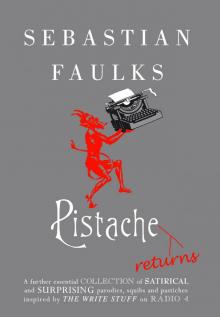 Pistache Returns
Pistache Returns The Girl at the Lion D'Or
The Girl at the Lion D'Or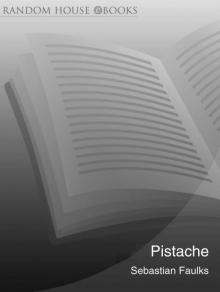 Pistache
Pistache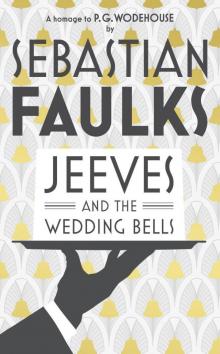 Jeeves and the Wedding Bells
Jeeves and the Wedding Bells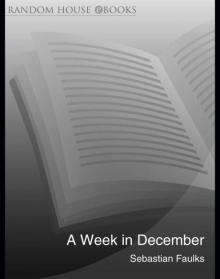 A Week in December
A Week in December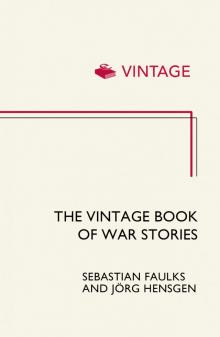 The Vintage Book of War Stories
The Vintage Book of War Stories Engleby
Engleby Birdsong
Birdsong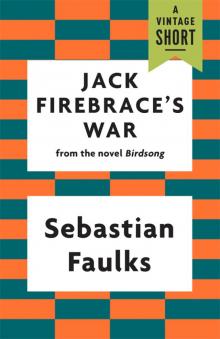 Jack Firebrace's War
Jack Firebrace's War Where My Heart Used to Beat
Where My Heart Used to Beat A Possible Life
A Possible Life The Fatal Englishman: Three Short Lives
The Fatal Englishman: Three Short Lives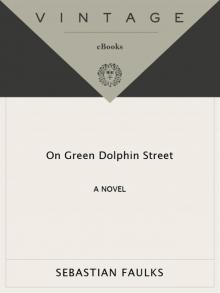 On Green Dolphin Street
On Green Dolphin Street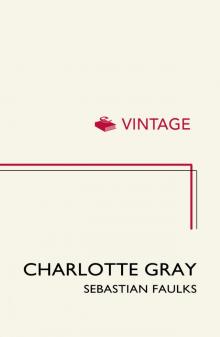 Charlotte Gray
Charlotte Gray A Broken World: Letters, Diaries and Memories of the Great War
A Broken World: Letters, Diaries and Memories of the Great War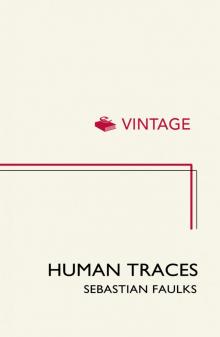 Human Traces
Human Traces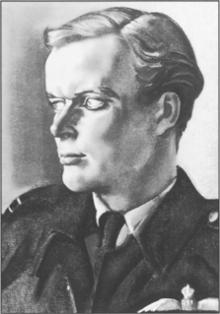 The Fatal Englishman
The Fatal Englishman A Broken World
A Broken World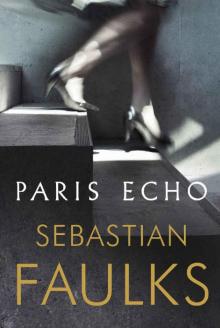 Paris Echo
Paris Echo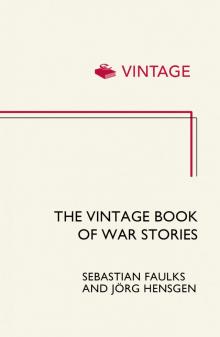 War Stories
War Stories Girl At the Lion d'Or
Girl At the Lion d'Or